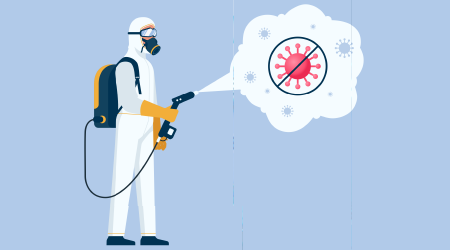Pest Control and COVID-19
This new reality has naturally led all of us to wonder if we can catch COVID-19 from pests like rodents or roaches, and what we can do to protect ourselves.
Home » Pest Control and COVID-19

Pest Control and COVID-19
The CDC website states, “We do not know the exact source of the current outbreak of coronavirus disease 2019 (COVID-19), but we know that it originally came from an animal source.”1 This new reality has naturally led all of us to wonder if we can catch COVID-19 from pests like rodents or roaches, and what we can do to protect ourselves.
To the best of our collective knowledge, COVID-19 is not a disease that someone can get from rats, roaches, or other pests. As Dr. Jorge Parada noted on March 6, 2020, “coronavirus is not spread by vector pests.”2 However, in the same article he goes on to state that COVID-19 is a zoonotic coronavirus, meaning that it has “jumped the species barrier,”3 and can travel from animal to human via physical contact. Probably the most famous case of an animal testing positive for COVID-19 was the tiger at the Bronx Zoo right here in NYC. A confirmed COVID-19 animal infection naturally raised concerns as to whether pests could transmit this new disease as they have transmitted others.
Most, if not all, pests have the potential to be disease vectors. We have always known that mosquitoes can spread malaria and ticks can spread Lyme disease. And of course, it is a well-known historical fact that rats played a role in the spread of the Bubonic plague and other diseases.
The World Health Organization lists several diseases and respiratory ailments that are spread by cockroaches, as well as over 35 diseases that are carried by rodents, and over 65 diseases that are spread by flies. Hantavirus is a well-known disease that rodents have been known to transmit to humans, and which can lead to Hantavirus Pulmonary Syndrome, a respiratory illness that is sometimes fatal.
In his bestselling book Rats, Robert Sullivan’s chapter on “Plague in America” begins: “The very first plague case in the continental United States appeared on March 6, 1900, in San Francisco’s Chinatown – by the Chinese calendar, 1900 was the year of the rat – and it was the same plague that had killed senators in ancient Rome, that had killed kings in medieval Europe. This time, though, scientists not only understood that it was transmitted via rats but had even discovered methods to combat the spread of the disease.”4
Pest Management Professionals have always been in the business of public safety. Whether it is where you sleep, where you eat, or where you work, you want to know that you are not in danger of being infected by any disease. And PMPs play a big part in providing that feeling of safety by keeping you pest-free.
Obviously, safety first is the order of the day, and we need to operate with every precaution. Now more than ever, pest management is critical to peace of mind and the assurance of physical wellbeing for quality of life. I foresee three areas where heightened precautions and practices will be part of our new normal:
PPE – this three-letter acronym, which has always been well known to exterminators, has now become a part of our global vocabulary. Personal protective equipment, particularly face masks that cover the mouth and nose, and gloves, are a necessity to protect against absorbing or spreading the airborne water droplets that are known to carry COVID-19. Dressing like an exterminator is the new hot and fashionable look and will be for some time.
Sanitation – as clean as we think we have been, we all know that now we must be cleaner. Regular disinfecting treatments can supplement our daily cleaning practices. Bioenzymatic foam treatments and localized steam heat to remove pest conducive conditions are valuable in removing the breeding sites where pests and bacteria thrive.5
Monitoring and Exclusion – To be sure, the gift of absolute certainty is a luxury whenever mortals can possess it. Maximum certainty, however, is an attainable goal, and enhanced monitoring and exclusion can help make that happen. Homes and businesses will increase the use of devices and products that indicate there has been a pest introduction, and exclusion to any potential entry points will be emphasized.
The history-making times in which we live are still unfolding, so therefore much remains to be seen as to how pests and COVID-19 will ultimately relate to one another. But suffice it to say for now we can take this opportunity to increase our awareness of potential disease vectoring and to do more to safeguard ourselves and others from peril.
_____________________________
1 https://www.cdc.gov/coronavirus/2019-ncov/daily-life-coping/animals.html
2 https://www.pestworld.org/news-hub/pest-health-hub/is-coronavirus-transmitted-by-pests/
3 Ibid.
4 Robert Sullivan, Rats: Observations on the History and Habitat of the City’s Most Unwanted Inhabitants (New York: Bloomsbury Publishing, 2004), p. 153.
5 The CDC has also confirmed that human fecal matter has been found to contain COVID-19. https://wwwnc.cdc.gov/eid/article/26/8/20-0681_article
About NYCHG
Established in 2009, The New York City Hospitality Group ("NYCHG") is a New York City-centric organization dedicated to serving the restaurant and hospitality industry. NYCHG is comprised of the best in class professionals that act as a resource to each other and the hospitality community.
Subscribe
2019 nychg.org | Apply for Membership

